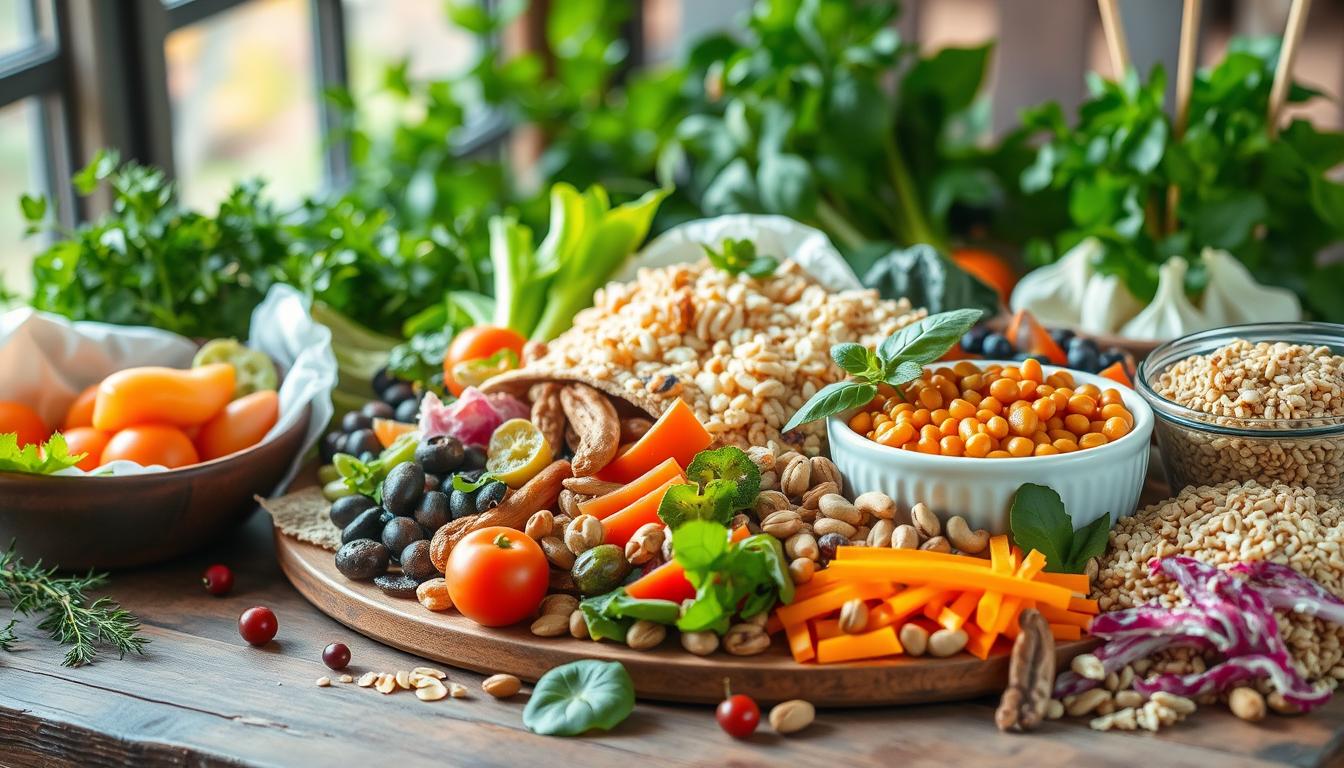A Plant-Based Diet is good for our health, the planet, and animals. It’s a great choice for those wanting to eat healthier and better. By choosing plants, we can help the environment and feel better too.
Switching to a Plant-Based Diet can change your life. This article will show you why it’s good and how to do it. You’ll learn about Nutrition and Healthy Eating.
With a Plant-Based Diet, you’ll get better Nutrition and help the planet. You’ll also feel healthier and more energetic. It’s a smart choice for a healthier, greener life.
Understanding What a Plant-Based Diet Really Means
A plant-based diet is not the same as a vegan or vegetarian diet. They all focus on eating more plants, but differ in how they treat animal products. A plant-based diet includes whole, unprocessed plants and sometimes a bit of animal products.
A vegan diet, however, has no animal products at all. This means no eggs, dairy, or even honey. A vegetarian diet might include dairy and eggs but no meat or fish. Knowing these differences helps you choose the right diet for you.
Defining Plant-Based vs. Vegan
The big difference between a plant-based diet and a vegan diet is animal products. A plant-based diet might have a little bit of animal products. But a vegan diet only has plants. Here’s a quick comparison:
- Plant-based diet: focuses on whole, unprocessed plants and sometimes a bit of animal products
- Vegan diet: has no animal products, including eggs, dairy, and honey
- Vegetarian diet: includes dairy and eggs but no meat or fish
Common Misconceptions Debunked
Many think plant-based diets lack protein. But foods like beans, lentils, and tofu are full of protein. Another myth is that plant-based diets are dull or limiting. But with some creativity, you can make delicious, varied meals.
Health Benefits of Adopting a Plant-Based Diet
A well-planned plant-based diet offers many health benefits. It can lower the risk of heart disease, diabetes, and some cancers. Eating whole, minimally processed foods can boost your wellness and cut down on chronic diseases.
Some key health benefits of a plant-based diet include:
- Lower blood pressure and cholesterol levels
- Improved blood sugar control
- Reduced risk of certain types of cancer
Switching to a plant-based diet is easy and fun. With a bit of planning and creativity, you can enjoy many nutritious and tasty plant-based meals.
By choosing a plant-based diet, you can feel better and live healthier. It’s a step towards a better, more sustainable .
| Health Benefit | Description |
|---|---|
| Lower Blood Pressure | Reduced risk of heart disease and stroke |
| Improved Blood Sugar Control | Reduced risk of diabetes and related complications |
Environmental Impact of Your Food Choices
Our daily Food Choices greatly affect the Environmental Impact of our lives. The way we produce food, especially animal products, harms our planet. It leads to more greenhouse gases, deforestation, and water pollution. By choosing what we eat wisely, we can lessen our harm to the environment and help the planet.
Choosing a plant-based diet is a smart move for the planet. Animal farming causes a lot of deforestation, clearing millions of acres for livestock and crops. On the other hand, growing plants for food needs much less land, water, and energy. By picking plant-based foods, we support sustainable farming and reduce our use of resources.
- Less greenhouse gas emissions
- More water conservation
- More efficient use of land
By thinking about our Food Choices, we can all help make the future greener. So, when you’re shopping or planning meals, think about the planet. Choose plant-based options to support Sustainable Living.
Essential Nutrients in a Plant-Based Diet
A well-planned plant-based diet gives you all the Essential Nutrients for health. It’s important to get enough protein, iron, calcium, and vitamin B12. These help keep your red blood cells healthy, your bones strong, and your immune system working well.
By eating healthily, you can easily get what you need every day.
Some top plant-based sources of these nutrients are:
- Legumes, such as lentils, chickpeas, and black beans, which are high in protein and iron
- Dark leafy greens, like kale and spinach, which are rich in calcium and vitamin B12
- Nuts and seeds, including almonds, chia seeds, and flaxseeds, which provide a boost of healthy fats and protein
Eating a variety of these foods helps you get all the Essential Nutrients you need. Don’t forget to drink plenty of water and eat less processed food to keep your diet balanced and healthy.
With a bit of planning and creativity, it’s simple to meet your daily nutrient needs on a plant-based diet. Focus on whole, unprocessed foods and stay informed about Nutrition. This way, you can thrive on a plant-based lifestyle and enjoy the many benefits of Healthy Eating.
| Nutrient | Plant-Based Sources | Recommended Daily Intake |
|---|---|---|
| Protein | Legumes, nuts, seeds | 0.8-1 gram per kilogram of body weight |
| Iron | Dark leafy greens, legumes, fortified cereals | 8-18 milligrams |
| Calcium | Fortified plant-based milk, dark leafy greens, tofu | 1,000-1,200 milligrams |
| Vitamin B12 | Fortified plant-based milk, nutritional yeast, supplements | 2.4-2.6 micrograms |
Weight Management and Disease Prevention
A well-planned plant-based diet is great for managing weight and preventing diseases. It focuses on whole, unprocessed foods. This can lower the risk of heart disease and some cancers, helping you stay healthy.
Plant-based diets help with natural weight control and better health. Foods like fruits, veggies, and whole grains keep you full. This makes it easier to avoid overeating and maintain a healthy weight.
Plant-based diets also prevent diseases like heart disease and some cancers. They are full of antioxidants, fiber, and nutrients. For example, fiber lowers cholesterol and improves blood sugar, reducing heart disease risk.
For overall Wellness, a plant-based diet is a smart choice. It includes a variety of plant-based foods. This supports health and wellbeing, while lowering chronic disease risk.
Some key plant-based foods for Weight Management and Disease Prevention are:
- Leafy greens like kale and spinach
- Cruciferous vegetables like broccoli and cauliflower
- Legumes like beans and lentils
- Whole grains like brown rice and quinoa
Adding these foods to a plant-based diet boosts health and wellbeing. It also lowers chronic disease risk.
| Food | Benefit |
|---|---|
| Leafy greens | Rich in antioxidants and fiber |
| Cruciferous vegetables | Support cancer prevention |
| Legumes | High in protein and fiber |
| Whole grains | Support healthy weight and blood sugar control |
Getting Started with Plant-Based Eating
Starting a plant-based lifestyle can seem tough, but it’s easier with the right help. When getting started, focus on making food choices that match your values and goals. A good lifestyle change can greatly improve your health and wellbeing.
To start, make sure your kitchen is ready. Here are some key items to get you going:
- Fresh fruits and vegetables
- Whole grains, such as brown rice and quinoa
- Legumes, like lentils and chickpeas
- Nuts and seeds, including almonds and chia seeds
Kitchen Essentials
A good kitchen is key for tasty, healthy plant-based meals. You’ll need a blender, food processor, and slow cooker.
Meal Planning Basics
Meal planning is crucial for a plant-based diet. Plan your meals for the week and make a shopping list. This way, you’ll have all the ingredients you need.
Shopping Guide
When buying plant-based foods, check labels. Look for products with less added sugars, salt, and unhealthy fats. Here’s a shopping list to get you started:
| Category | Examples |
|---|---|
| Fruits | Apples, bananas, berries |
| Vegetables | Broccoli, carrots, sweet potatoes |
| Protein sources | Legumes, nuts, seeds |
Common Challenges and How to Overcome Them
Starting a plant-based diet can be tough. Many people face Common Challenges that make it hard to keep up. The Vegan and Vegetarian diets are especially popular, but they come with their own hurdles.
Finding substitutes for favorite foods is a big challenge. So is dealing with social situations where plant-based options are scarce. And managing cravings for foods that aren’t plant-based is another obstacle. To beat these challenges, it’s key to be ready and have a strategy.
Here are some tips to help you overcome common challenges:
- Research plant-based recipes and meal ideas to find alternatives to your favorite foods
- Connect with other plant-based individuals to build a support network and learn from their experiences
- Plan ahead when eating out or attending social gatherings to ensure you have plant-based options available
Knowing the common challenges and having a plan can help you stay on track. You can keep a consistent plant-based lifestyle, whether you’re Vegan or Vegetarian.
| Challenge | Solution |
|---|---|
| Finding plant-based alternatives | Research plant-based recipes and meal ideas |
| Dealing with social situations | Plan ahead and connect with other plant-based individuals |
| Managing cravings | Find healthy plant-based alternatives to satisfy cravings |
Plant-Based Protein Sources and Combinations
Many people wonder if they can get enough protein from plants. The answer is yes, and there are many options. A well-planned plant-based diet can provide all the necessary protein for good Nutrition and Healthy Eating.
To get a balanced amino acid profile, it’s important to mix different plant-based foods. Legumes, whole grains, and nuts are great choices.
Complete Protein Options
Some plant-based foods are complete proteins, meaning they have all nine essential amino acids. Quinoa, chickpeas, and black beans are examples. You can also combine foods like brown rice and lentils to get a complete protein.
Protein Myths Explained
There are many myths about protein on a plant-based diet. One myth is that plant-based diets lack protein. But, with a little planning, it’s easy to get enough protein from plants.
Building Muscle on Plants
Building muscle on a plant-based diet is possible with the right foods and training. Foods like tofu, tempeh, and seitan help with muscle growth and repair.
- Legumes: lentils, chickpeas, black beans
- Whole grains: quinoa, brown rice, whole wheat
- Nuts and seeds: almonds, chia seeds, hemp seeds
By adding these foods to your diet and knowing how to mix them, you can get enough Plant-Based Protein. This ensures good Nutrition and Healthy Eating.
| Food | Protein Content (per serving) |
|---|---|
| Quinoa | 8g |
| Chickpeas | 15g |
| Black beans | 15g |
Budget-Friendly Plant-Based Shopping
Choosing a plant-based lifestyle is a smart move for your health and the planet. Many think it’s pricey, but it doesn’t have to be. With some planning and smart food choices, you can eat plant-based without spending a lot.
Start with whole foods like fruits, veggies, and grains. These are cheap and full of nutrients. Look for seasonal produce to save money. Also, buy non-perishable items like canned beans and grains when they’re on sale.
Here are some tips for budget-friendly plant-based shopping:
- Buy in bulk: Nuts, seeds, and grains are cheaper in bulk.
- Shop at local markets: Local markets offer fresh, affordable produce.
- Plan your meals: Cooking at home saves money and reduces waste.
Changing your shopping habits can save you money while enjoying plant-based benefits. Remember, sustainable living is about being good to the environment and your wallet. It’s also about making food choices that are healthy and affordable.
With a bit of creativity and planning, plant-based eating can be both affordable and sustainable. It’s a choice that can fit your lifestyle and budget.
| Food Item | Price | Quantity |
|---|---|---|
| Brown Rice | $1.50 | 2 lbs |
| Canned Black Beans | $1.00 | 4 cans |
| Frozen Mixed Vegetables | $2.00 | 1 bag |
Dining Out While Following a Plant-Based Diet
Following a plant-based diet can be very rewarding. It makes Dining Out a part of your Wellness routine. Many restaurants now have plant-based options that fit your Lifestyle.
When you’re at a restaurant, being prepared is key. Researching the restaurant beforehand helps you find plant-based options. You can also ask your server for help or to make changes to your meal.
Restaurant Navigation Tips
- Look for plant-based symbols or indicators on the menu
- Ask your server about potential cross-contamination with animal products
- Don’t be afraid to request modifications or substitutions
Being mindful of your choices and talking to the staff makes Dining Out healthy and enjoyable. It meets your Wellness goals and plant-based Lifestyle.
Menu Modification Strategies
Many restaurants are open to making plant-based changes. You can ask for vegan cheese or plant-based milk alternatives in your meal. A bit of creativity and talking to the staff can make your meal delicious and satisfying.
Athletic Performance and Plant-Based Nutrition
A well-planned plant-based diet can give you all the nutrients for top Athletic Performance. It’s key to get enough Nutrition for energy, recovery, and better performance. Many athletes have switched to plant-based diets and see better endurance and less inflammation.
Plant-based Healthy Eating offers many benefits for athletes, including:
- More antioxidants to protect muscles
- Better heart health for longer endurance
- Help with keeping a healthy weight
Studies show plant-based diets can meet all nutritional needs for athletes. As Nutrition is vital for success, focus on whole, unprocessed foods. This way, athletes can reach their best performance and goals.
Novak Djokovic, a tennis star, and David Carter, a football player, have seen big improvements with plant-based diets. With the right Nutrition plan, a plant-based diet is a great choice for athletes wanting to eat healthily and succeed in their sports.
| Athlete | Sport | Plant-Based Diet Benefits |
|---|---|---|
| Novak Djokovic | Tennis | Improved endurance and recovery |
| David Carter | Football | Increased energy and reduced inflammation |
Conclusion: Embracing a Healthier, More Sustainable Future
Adopting a plant-based diet brings many benefits. It improves your health and supports the environment. By choosing whole, plant-based foods, you’re moving towards a better future.
Going plant-based is more than just food. It’s about caring for your health, the planet, and all living beings. With many resources and tasty recipes, switching to plant-based is simple.
Want better heart health, less environmental impact, or more tasty, healthy foods? Choosing plant-based can change your life and the world. Start today and join the journey to a greener, healthier tomorrow.
FAQ
What is a plant-based diet?
A plant-based diet focuses on eating foods from plants like fruits, veggies, and whole grains. It also includes nuts and seeds. This diet cuts down on animal products like meat and dairy.
How is a plant-based diet different from a vegan diet?
A vegan diet doesn’t allow any animal products. But a plant-based diet is more flexible. It lets you have small amounts of animal foods sometimes. The main goal is to eat lots of plant-based foods.
What are the health benefits of a plant-based diet?
Eating a plant-based diet can lower your risk of heart disease and diabetes. It also helps prevent some cancers and obesity. With the right planning, it can give you all the nutrients you need.
How can a plant-based diet benefit the environment?
Choosing plant-based foods can cut down your carbon footprint. It saves water and uses land more efficiently than animal products. Plant-based foods are generally better for the planet than animal agriculture.
How do I ensure I get all the necessary nutrients on a plant-based diet?
You can get all the nutrients you need from a plant-based diet. Eat a variety of foods like legumes, whole grains, and leafy greens. This way, you’ll meet your nutritional needs easily.
Can a plant-based diet help with weight management and disease prevention?
Yes, it can. Plant-based foods are high in fiber and nutrients but low in calories. This helps with weight control and lowers disease risk.
How can I get started with a plant-based diet?
To start, stock up on plant-based staples and learn to plan meals. Look for recipes and resources. Start slow and find what works for you.
What are some common challenges when adopting a plant-based diet?
Challenges include finding plant-based alternatives and dealing with cravings. But, there are ways to overcome these. Resources and strategies can help.
Where can I find plant-based protein sources?
Many plant-based protein sources exist, like legumes and nuts. You can also use whole grains and soy products. Mixing different foods gives you all the protein you need.
How can I dine out while following a plant-based diet?
When dining out, look for plant-based options and talk to your server. Find restaurants that offer plant-based choices. With some planning, eating out can be enjoyable.



